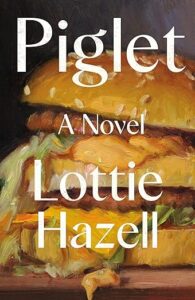Lottie Hazell’s debut novel Piglet is about one British woman’s appetites – for acceptance, for respectability, and yes, for food. Piglet, christened with a terrible nickname by her family, is so close to rising above her working-class roots. She’s engaged to a wealthy man, Kit, and they live in a lovely house in which they entertain and show off their enviable life. But a few weeks before their wedding, Kit admits to have betrayed Piglet, and she is forced to decide whether to passively accept his apology and ride the wave toward her wedding, or stand up for herself and examine what she really wants.
Why I picked it up: How could I resist that premise and that cover?
Reading Piglet is like watching a slow trainwreck. Piglet unravels throughout the course of the novel, making bad decisions as her base impulses, most of which revolve around food, take over and keep her from expressing her true desires. She resorts to binge eating to avoid facing the reality of her depressing situation. As the wedding approaches, Piglet disassociates, going through the motions with her family and trying to execute her previous plans to bake a ridiculously complicated dessert for her guests. Needless to say, things don’t go well.
Piglet isn’t a likable person, but as a reader, you understand her and what got her to where she is. The what-will-Piglet-do? question propels the book forward, culminating in the grim crescendo of the wedding and the crossroads of Piglet’s future.
Overall, I liked Piglet. I wouldn’t call it an uplifting read, but it was very well-written and brutally honest.
I listened to Piglet on audio. It is narrated by Rebekah Hinds, whose precise – and lonely – delivery was perfect for Piglet.
Piglet was the 9th book of 2024 and satisfied the One Word Title and Debut Novel categories of the 2024 EDIWTB Reading Challenge.











About Me
I have been blogging about books here at Everyday I Write the Book since 2006. I love to read, and I love to talk about books and what other people are reading.